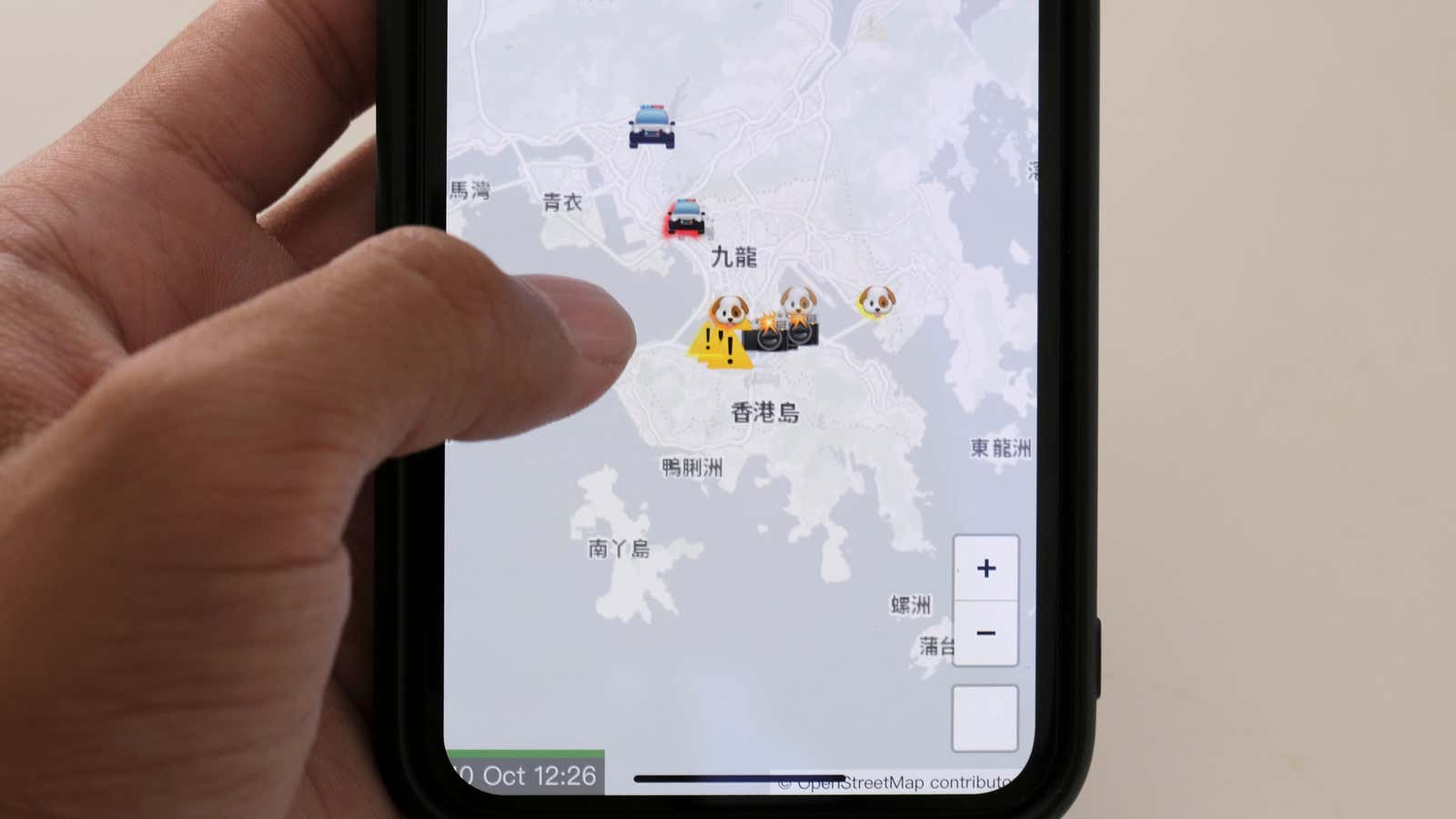Apple CEO Tim Cook wrote an email to employees yesterday (Oct. 10) defending the company’s decision to remove the app of HKMap.live—a real-time, volunteer-run, and crowdsourced map of the city’s protests—by reiterating that the app was a threat to public safety and was used to target violence against police.
Cook’s email says the decision was based on information provided to Apple by the Hong Kong Cybersecurity and Technology Crime Bureau and “users in Hong Kong,” but did not mention specifics about when, how, or how often the app was used in such a way that was a danger to public safety. At a news conference yesterday, Hong Kong officials deflected a reporter’s question about Apple’s decision to remove the app to the company. Today (Oct. 11), Hong Kong police superintendent Kong Wing-cheung said the force had contacted the app developer and been in touch with several app stores over their concern that the app could “leak the police officers’ whereabouts, which could facilitate the criminals to ambush our officers.”
HKMap.live is a dynamic online map that shows the latest developments during the increasingly volatile protests in Hong Kong. Various emoji show the locations and movements of police and protesters, as well as places where tear gas has been deployed or barricades erected. The map is also used by passersby and residents to get a quick overview of the latest developments, so as to avoid tear gas and other trouble spots.
The decision to remove the app came on the heels of an article in Chinese state media condemning the company for its “unwise and reckless” decision of approving the “poisonous” map app, and asking if Apple intended to be an “accomplice to rioters” after it approved the app following an initial rejection. In recent days, Apple also removed the Quartz app from its Chinese app store at the request of China, and deleted the Taiwan flag emoji from iPhone keyboards for Hong Kong users in its latest software update.
Zeynep Tufekci, an associate professor at the University of North Carolina, Chapel Hill who studies the intersection of technology and social movements and who has spent time observing the protests in Hong Kong this year, said in a series of tweets that Apple’s claims against HKMap.live aren’t backed up by evidence or media reports of any individual police officers being “ambushed.” The information on the app comes from members of the public who can physically see instances of tear gas being fired or mass police movements.
The web version of HKMap.live is still in use, and it also remains available on Google Play.
Hong Kong lawmaker Charles Mok, who represents the information technology sector in the Legislative Council, wrote in a letter addressed to Cook that as a user of the app he was “deeply disappointed” by Apple. “If sharing information on a real-time basis equates to encouraging criminal activity… the same standard should also be applied to review” other chat apps such as WhatsApp and Telegram where people are also sharing such information.
Quartz has requested further clarification from Apple around its decision.
Coming at a time of heightened scrutiny around the way American corporations capitulate to censorship requests from Beijing due to the NBA’s spat with China and US game maker Blizzard’s ban of a Hong Kong player, many are questioning whether Apple’s app removal was not simply another instance of a US company bowing to China’s dictates—as a number of the map’s users have pointed out, its functions are not a threat to public safety or a violation of Apple’s rules. The map’s administrator, a 20-something finance professional in Hong Kong who goes by Kuma, called Apple’s move a “political decision.”
Kuma’s not the only one who sees it that way. Cook’s explanation has further fanned the flames of American anger against China’s censorship attempts that kicked off in earnest with the NBA saga earlier this week. Republican senator Tom Cotton of Arkansas and Oregon’s Ron Wyden, a Democrat, for example, were among the lawmakers who have condemned Apple.
More explanation from Cook on Apple’s relationship with China is almost certain to come.




